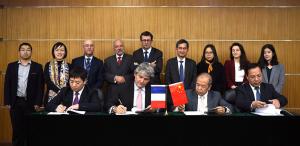Fusion world
A reinforced Sino-French collaboration
4 Dec 2017
Interaction between French and Chinese fusion laboratories began in the early 1990s with a collaboration on the first Chinese superconducting tokamak HT-7.
Sponsored at the highest political level in both states, the agreement lends added strength to the ongoing collaboration between French and Chinese fusion institutions. From left to right: Yuntao Song, Deputy Director of the ASIPP Institute (China Academy of Sciences); Gabriele Fioni, Director of International Cooperation at CEA; Luo Delong, Director of ITER China; and Xuru Duan, Director of the China National Nuclear Corporation.
Over the years, the collaboration intensified with the creation of training programs for PhD and postdoctoral students and, more recently, with the establishment of "associated laboratories" between the French Institute for Magnetic Fusion Research (IRFM) and China's main fusion institutions: the Institute of Plasma Physics of the Chinese Academy of Sciences (ASIPP) and the Southwestern Institute of Physics (SWIP).
ITER of course is now at the centre of this collaboration. The two Chinese institutions are key partners in the WEST project (the refurbished Tore Supra tokamak that serves as a test bench for ITER) and joint teams are involved in several R&D activities in support of both ITER and Chinese national fusion projects.
Two weeks ago, on 24 November, Sino-French collaboration on fusion took a whole new dimension.
Whereas cooperation to date had been a bilateral affair between laboratories, it will now develop and expand within a high-level political agreement between the French Alternative Energies and Atomic Energy Commission (CEA) and the Chinese Ministry of Science and Technology (MOST). The agreement was signed in Beijing in the presence of the French Minister of Foreign Affairs and the Vice-Minister of MOST.
The agreement establishes SIFFER (for SIno-French Fusion Energy centeR), a research consortium that brings together IRFM, ASIPP, SWIP and the Chinese Domestic Agency ITER China.
As it is sponsored at the highest political level in both states, the agreement lends added strength to the ongoing collaboration between French and Chinese fusion institutions—not only on ITER and WEST, but also on the operational Chinese machines (EAST, HL-2A and HL-2M) and on the planned China Fusion Engineering Test Reactor (CFETR) that aims to bridge the gap between ITER and the future demonstration reactor (DEMO).


